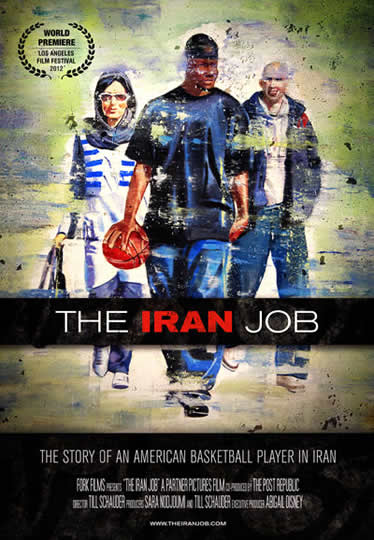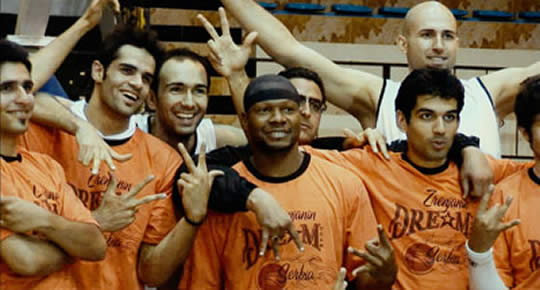 Kevin Sheppard, a flashy point guard who once played for Jacksonville University, makes his living playing overseas in countries such as Brazil, Spain, Venezuela, China and Israel. He gets an unexpected job offer—a year-long contract to head up A.S. Shiraz, a new team competing in Iran’s Super League. Thus begins his journey from a life of relative comfort and security into an uncertain new reality, playing professional basketball in Iran.
Kevin Sheppard, a flashy point guard who once played for Jacksonville University, makes his living playing overseas in countries such as Brazil, Spain, Venezuela, China and Israel. He gets an unexpected job offer—a year-long contract to head up A.S. Shiraz, a new team competing in Iran’s Super League. Thus begins his journey from a life of relative comfort and security into an uncertain new reality, playing professional basketball in Iran.
Hollywood has produced dozens of sports films about heroic underdogs fighting the odds (among them The Longest Yard, Bull Durham, Remember the Titans, The Blind Side, Moneyball), but few are as compelling and evocative as Till Schauder’s low-budget indie. This 93-minute documentary follows its unlikely hero—an American basketball player from tiny St. Croix in the Virgin Islands—into the maw of Islamic doom, only to turn our expectations upside down and our emotions inside out. In The Iran Job, shot almost entirely on location in Shiraz and Tehran, the women are strong and outspoken, men are team players who push themselves to the limits, and almost everyone loves Americans—except perhaps the morality police and Ahmadinejad. The film is a winner.Since the days of George W. Bush, the nation of Iran has found itself on the Axis of Evil list that includes North Korea and Saddam Hussein’s Iraq. But American skepticism of Iran goes back to when Ayatollah Khomeini and a regime of clerics stole the student revolution out from college-age protesters in 1980, taking American diplomats hostage in Tehran under Jimmy Carter.
At first glance Iran isn’t going to elicit our empathy. The filmmakers shoot several murals that raise our fears, “Down With America” and “We Will Make America Suffer a Severe Defeat” among them. Kevin Sheppard knows Iran is reputed to support Hezbollah terrorists and is suspected of developing a nuclear weapons program. His fiancée Leah thinks along the same lines, fearing the worst. And right around this period, Ahmadinejad calls for the destruction of Israel, America’s ally in the Middle East.
Still, we are easily drawn into the film by Sheppard’s gregarious sense of humor, and his willingness to face a new challenge. Taking the mostly-rookie A.S. Shiraz team to the next level won’t be easy. The only other foreign player is a giant from Serbia, Zoran, who will be Sheppard’s roommate. At first, the Iranian players seem to lack the courtside aggression we’ve come to expect from American teams. In his role as the new captain and a natural leader as the most experienced player on the team, Sheppard faces his share of frustration and disappointment. And if he doesn’t take A.S. Shiraz to the finals, he’s out of a job.
During his off-hours, Sheppard proves to be a devoted tourist, making friends easily wherever he goes, visiting the sites as Shiraz’s new American celebrity sports figure. Most notable in The Iran Job are the three Iranian women, Elaheh, Hilda and Laleh, who become Sheppard’s greatest fans. They are all in their 20s (as are most of the people in this film) and have plenty of opinions. Kareem Roustom provides the film’s original music and scores many scenes with Iranian pop and hip hop that helps to bridge the cultural barrier, with some great beats performed by ZedBazi (check them out on iTunes). In fact, the whole vibe of the film is hip-hop edgy. 
The filmmakers do a fine job of capturing Shiraz’s beauty and its teeming city life with some deft camera work.
Till Schauder, a dual national German-American, directs and produces The Iran Job, with his Iranian American wife, Sara Nodjoumi, who previously worked on the documentary series I Call Myself Persian: Iranians in America. In the press notes, he explains, “I first became interested in the topic of American basketball players in Iran upon reading that some of the players faced severe fines from the U.S. State Department for allegedly breaking the embargo against Iran…I was inspired by these athletes, who arguably do more for dialogue between Iran and the West than any politician on either side.” Reminded of Nixon-era ping-pong diplomacy with China, Schauder began following Kevin Sheppard to Iran, even without a budget in place (some of the completion funds for The Iran Job came later, from a Kickstarter campaign).
The director filmed Sheppard and the A.S. Shiraz team (most notable are Mehdi, Ali, Kami and Zoran) over several visits, “until on my last trip—in the run-up to Iran’s 2009 election—I was informed that I had made it onto a ‘black list’ (for reasons still not clear to us), and was put in detention in a kind of ‘hotel-prison’ inside the glitzy new Tehran airport.” The last half-hour of the film is the most rousing, as Iranians are going to the polls, and then pouring into the streets to protest what they asserted were falsified election results that maintained Ahmadinejad in power. Thus the A.S. Shiraz team and their destiny is looped into the fate of the Iranian people who in what became known as the Green Movement (a precursor to the Arab Spring) are calling for democracy, despite the despotic Islamic regime under which they endure.
Says Schauder, “Iran is often portrayed as a terrorist nation, a nuclear threat, and a charter member of the Axis of Evil bent on the destruction of Israel. But behind the headlines—and the aggressive rhetoric of Iran’s hardliners—lies one of the most fascinating nations, as sensuous as it can be challenging, with a life-loving people.”
And that’s the point. The Iran Job is much less about governments than it is about people—both Iranians and Americans, who when we share our stories and our passions (basketball, music, religious freedom) cannot be fooled into killing each other.
The Iran Job has its world premiere in the LA Film Festival on June 15/16 and will open in limited U.S. release in September 2012.
This review first appeared in the Levantine Review and appears here by arrangement with the editor.

